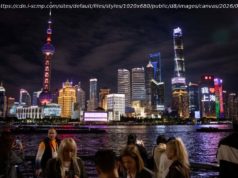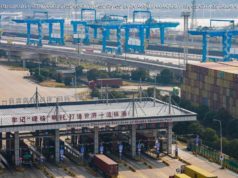One year on, the first national security trial shows how.
Tong Ying-kit was arrested a year ago, accused of driving a motorcycle into a group of policemen, a flag trailing behind him that read: “ Liberate Hong Kong, revolution of our times.” His trial, which began last week, marks a milestone for Hong Kong: Tong is the first person charged under its national security law. The Beijing-imposed legislation went into effect a year ago. It is vague, it is broad, and it targets crimes such as secession, subversion, colluding with foreign powers, and terrorism. It portended a sweeping crackdown on dissent and an erosion of the rule of law in Hong Kong. Since then, more than 100 people have been arrested under the national security law, and more than 50 charged. And now, with Tong’s trial underway, the crackdown is here. Tong’s saga reveals how deeply the national security law has transformed Hong Kong in just one year. It has chilled Hong Kong’s pro-democracy movement. But it has also radically — and swiftly — disrupted the territory’s long tradition of an independent judiciary. As this trial plays out, it will set a precedent for the national security defendants who come after. Tong’s trial is the first, but it will not be an outlier. “It is the application of a law,” said Martin Flaherty, a professor of international law at Fordham University School of Law, “that means the end of Hong Kong as the world knew it.” Tong Ying-kit’s trial and the national security law On July 1, 1997, Great Britain returned Hong Kong to China’s control. The handover created a setup known as “one country, two systems,” which established that Hong Kong would maintain separate economic and political systems from mainland China for 50 years, through at least 2047. That includes Hong Kong’s storied tradition of common law, an independent judiciary, and protections for certain freedoms like speech, assembly, and the press, which are preserved in Hong Kong’s Basic Law, a kind of mini-constitution. The date of the handover has traditionally been one of protest in Hong Kong among those who oppose China’s rule — and, in the years since 1997, Beijing’s tightening of control over the territory. That included in 2019, when a summer of massive protests against the Hong Kong government over a controversial extradition bill grew into a larger pro-democracy movement. The Chinese government started to lose patience with the months of unrest, and after the coronavirus pandemic slowed protests in 2020, China interceded with its national security law to crush the resistance for good. On July 1, 2020, Hongkongers still demonstrated, in defiance of both coronavirus restrictions and the new national security law. Quickly, though, national security arrests began, including of people who had signs and flags calling for Hong Kong’s independence. Tong Ying-kit was among them. Reportedly a 24-year-old cook at a ramen restaurant, Tong faces two counts under the national security law: terrorism and inciting secession. The charge of inciting secession is tied to the “Liberate Hong Kong” flag he brandished, which authorities say represents pro-independence sentiments. That slogan has been a feature of Hong Kong resistance for years, but is effectively banned under the national security law. The terrorism charges are a bit weird, and are apparently tied to police claiming he tried to run them over with his motorcycle. Tong’s lawyers are arguing he did not intentionally hit the police, but lost control of his bike after being distracted when a police officer swung his shield toward him. Prosecutors have tried to say that Tong rode through police cordons, and then attempted to run over three officers who tried to stop him. Recently, prosecutors added a dangerous driving charge under previously existing traffic laws, a non-national-security-law offense.
Home
United States
USA — China China’s national security legislation is destroying Hong Kong’s rule of law






